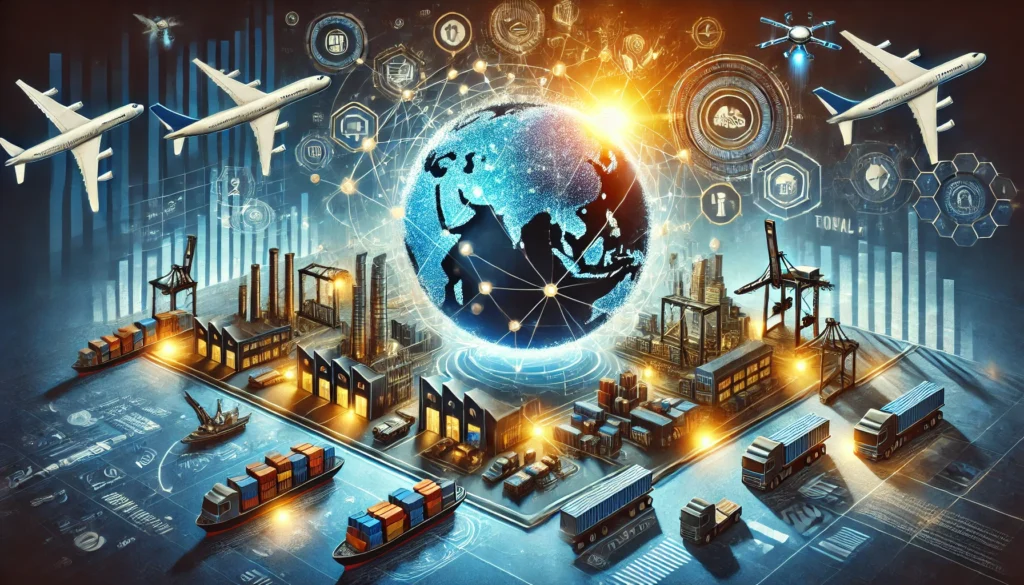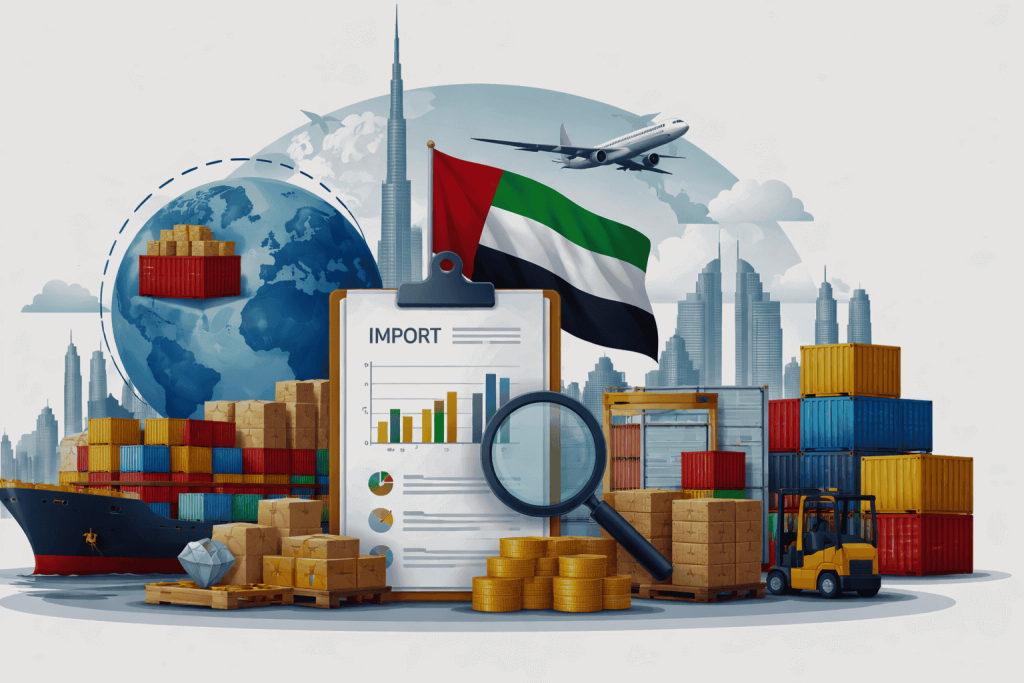Introduction to Global Trade
Global trade refers to the exchange of goods and services across international borders, playing a pivotal role in driving economic growth and development.
It has evolved significantly over the years, thanks to advancements in technology, communication, and transportation, allowing businesses to reach broader markets beyond their domestic boundaries.
Import and export companies facilitate these transactions, serving as vital intermediaries that connect producers and consumers worldwide.
The significance of global trade cannot be overstated, as it provides countries with access to a wider variety of products than they could produce alone.
By participating in international commerce, nations can specialize in the production of goods in which they hold a comparative advantage, ultimately leading to increased efficiency and lower prices for consumers.
This interconnectedness among economies fosters competitiveness and innovation, enhancing the quality of goods available in the market.
Several driving forces underpin global trade, including globalization, economic policies, and technological advancements.
Globalization has led to the reduction of trade barriers, enabling goods to flow more freely across borders.
Economic policies such as trade agreements and tariffs also play a crucial role, influencing how international commerce is conducted.
Meanwhile, technological innovations have made it easier for import export companies to manage logistics, track shipments, and communicate with clients, all of which contribute to the efficiency of global supply chains.
Import and export companies are indispensable players within this dynamic landscape, enabling smooth transactions between different markets.
They not only help manage the complexities of international shipping and customs regulations but also assist clients in navigating cultural barriers and currency fluctuations.
As the global market evolves, these companies are continually adapting, finding new ways to innovate and improve their service offerings, ultimately shaping the future of international trade.
Understanding Import and Export Companies
Import and export companies play a pivotal role in the global trading ecosystem, acting as intermediaries that facilitate the flow of goods and services across international borders.
These companies are distinguished by their core functions, which involve the importation of products from one country and the exportation of products to another.
The operation of these companies is crucial for businesses looking to expand their reach beyond domestic markets.
The primary function of an import export company includes sourcing products from manufacturers or suppliers in one country, then navigating the logistics of shipping these goods to a destination country.
Similarly, they assist businesses in exporting goods by finding suitable markets and ensuring compliance with local regulations.
This intricate dance of moving goods across borders necessitates a comprehensive understanding of customs laws, tariffs, and international trade agreements, making these companies essential partners in global commerce.
Import and export companies typically offer a range of services that extend beyond mere transportation.
These may include logistics management, which ensures that goods are shipped efficiently and cost-effectively.
Furthermore, they often provide customs clearance services, which help businesses navigate the complex paperwork and procedures required to move goods legally across borders.
Additionally, many firms engage in market analysis to identify potential opportunities and risks associated with various international markets, thereby guiding businesses in making informed decisions.
In summary, import and export companies serve as vital facilitators in international trade, empowering businesses to operate on a global scale.
Their expertise in logistics, customs, and market dynamics not only simplifies the complexities of global trade but also enhances economic connectivity between nations.
Understanding the operational nuances of these companies is essential for any business looking to thrive in today’s interconnected world.
Top Import and Export Companies Shaping the Industry
The dynamics of global trade have been significantly influenced by several key players in the import-export sector.
These companies have not only contributed to the economic fabric of their respective countries but also shaped international trade practices through innovative strategies and extensive networks.
One of the prominent names in this industry is Maersk, a Danish shipping company that has established itself as a leader in container shipping and logistics.
Founded in 1904, Maersk has expanded its operations to over 121 countries, facilitating effective trade routes and promoting global commerce.
Another influential entity is DHL, a division of the German logistics firm Deutsche Post DHL Group.
Known for its comprehensive range of logistics services, DHL provides solutions that cater to the ever-evolving needs of businesses engaged in international trade.
Founded in 1969, the company boasts an expansive network that ensures timely deliveries, thus playing a crucial role in enhancing the efficiency of import and export operations worldwide.
Additionally, FedEx is a key player in the import-export market, offering express transportation and logistics services.
Established in 1971, FedEx revolutionized package shipping with its innovative tracking systems and commitment to customer satisfaction.
Its global reach and reliable service have solidified its position as a frontrunner in the logistics industry, making it easier for companies to engage in cross-border trade.
Moreover, Alibaba Group has emerged as a powerful force in the import-export domain, particularly through its online platforms that connect suppliers and buyers worldwide.
Founded in 1999, Alibaba has transformed the way businesses approach global trade, emphasizing digital solutions that expand market access for small and medium-sized enterprises.
This company’s impact is particularly evident in how it fosters trade relationships across borders, further strengthening the import-export ecosystem.
These companies exemplify the transformative effect that established import-export companies can have on the industry.
By enhancing logistics, providing technological solutions, and expanding market access, they collectively contribute to the globalization of trade, which is essential for the modern economy.
Innovative Practices in Import and Export
The landscape of global trade is undergoing a significant transformation as leading import-export companies adopt innovative practices that leverage technology and sustainability.
One notable trend is the integration of artificial intelligence (AI) in logistics management.
By utilizing AI-driven solutions, these companies can optimize their shipping routes, improve inventory management, and enhance overall operational efficiency.
This results in reduced shipping times and lower costs, ultimately benefiting businesses and consumers alike.
Moreover, blockchain technology is revolutionizing supply chain transparency.
Import-export companies are increasingly employing blockchain to create tamper-proof records of transactions and shipments.
This innovation enables real-time tracking of goods from origin to destination, thereby minimizing disputes and enhancing trust among stakeholders.
As transparency becomes a fundamental expectation in the industry, blockchain serves as a crucial tool for ensuring the integrity and authenticity of trade processes.
Sustainability is another critical aspect driving innovation in the import-export sector.
Many companies are now adopting eco-friendly shipping practices, which include utilizing renewable energy sources and optimizing packaging materials to reduce waste.
This shift not only aligns with global sustainability goals but also meets the growing consumer demand for environmentally responsible practices.
Import-export companies are striving to enhance their green credentials, indicating a significant change in how global trade operations are managed.
Through these innovative practices, the import-export industry is not merely adapting to changing demands; it is also paving the way for a more efficient, transparent, and sustainable future.
By embracing advancements in technology and adopting environmentally friendly practices, these companies are defining the next generation of global trade.
The integration of AI, blockchain, and sustainability illustrates a comprehensive approach toward optimally managing the complexities associated with international commerce.
Case Studies: Success Stories in Global Trade
The landscape of international trade has been significantly influenced by several import export companies that have adopted innovative strategies and practices.
Exploring these case studies offers invaluable insights into how these entities have transformed their operational frameworks, leading to successful outcomes in global commerce.
One noteworthy example is Maersk, a global leader in container shipping and logistics.
Their commitment to integrating advanced technology into their operations has streamlined the shipping process, reduced delays, and enhanced supply chain transparency.
By utilizing data analytics, Maersk has optimized routes and improved resource allocation, thereby increasing efficiency.
Their proactive approach to sustainable practices, such as investing in eco-friendly vessels, further positions them favorably in the competitive global market.
The lessons from Maersk’s strategies emphasize the importance of leveraging technology in logistics, which can serve as a model for other import export companies seeking to boost their operational efficacy.
Another case study worth considering is Alibaba Group, which has redefined e-commerce and trade.
By connecting businesses worldwide through their digital marketplace, Alibaba has enabled small and medium-sized enterprises (SMEs) to engage in global trade with minimal barriers.
Their platform provides tools for product visibility and access to international markets, which fosters economic inclusivity.
By prioritizing user experience and implementing secure payment solutions, Alibaba enhances buyer-seller interactions, showcasing the importance of customer-centric strategies in the import export sector.
The insights gleaned from Alibaba’s practices reveal the transformative power of digital platforms in bridging gaps and fostering international trade.
These case studies illustrate that successful import export companies are those that embrace innovation and adapt to evolving market trends.
By highlighting their strategic initiatives and learnings, the broader industry can extract applicable lessons that help navigate the complexities of global trade.
Challenges Faced by Import and Export Companies
In the dynamic landscape of global trade, import and export companies encounter a myriad of challenges that can significantly impact their operations.
One of the foremost issues is the regulatory framework that governs international trade. Import-export companies must navigate a complex web of regulations that vary not only by country but also by product type.
Compliance with these regulations often requires extensive documentation and a deep understanding of customs procedures, which can prove burdensome for even the most seasoned players in the industry.
Moreover, political instability in certain regions poses a substantial risk to import and export activities.
Changes in government policies, trade agreements, or even civil unrest can disrupt the supply chain, impede logistics, and lead to unpredictable shifts in market conditions.
Companies engaged in international trade must constantly monitor geopolitical trends to align their strategies accordingly. Failure to do so could result in financial losses or even jeopardize their operational viability.
Another significant challenge faced by import-export companies is the fluctuation in demand for goods.
Market preferences can shift rapidly due to consumer trends, economic changes, or emerging technologies.
Consequently, companies engaged in the import and export business must remain agile and adaptable.
The ability to forecast market trends and adjust inventory levels accordingly is crucial for maintaining profitability and minimizing waste.
Delays in adapting to these changes can lead to excess stock or missed opportunities for sales, highlighting the constant balancing act that import-export companies must perform.
These challenges underscore the complexities inherent in the operations of import-export companies. Awareness and understanding of these hurdles are essential for businesses looking to thrive in the competitive realm of global trade.
The Role of Sustainability in Global Trade
The increasing emphasis on sustainability has profoundly influenced global trade practices, compelling top import-export companies to rethink their operational strategies.
As environmental concerns rise, businesses are recognizing that adopting sustainable practices is not just an ethical responsibility but also a necessity for long-term viability.
These companies are keenly aware that their actions impact the environment, and thus they are actively seeking ways to minimize their carbon footprints.
One significant avenue through which import and export companies are making strides is in sustainable sourcing.
This refers to the practice of obtaining materials and products in a manner that is environmentally and socially responsible.
By prioritizing suppliers who adhere to stringent environmental guidelines, businesses can reduce the adverse effects associated with resource extraction and production.
This strategic shift not only addresses environmental concerns but also appeals to a growing consumer base that values sustainability in their purchasing decisions.
Moreover, eco-friendly logistics solutions are becoming paramount to the operational frameworks of import-export companies.
Strategies include optimizing shipping routes, utilizing energy-efficient vessels, and investing in renewable energy sources for warehousing and distribution.
These changes not only reduce greenhouse gas emissions but also enhance operational efficiencies, demonstrating that sustainable practices can lead to cost savings as well.
To further champion sustainability, many of these companies are investing in technology that allows for better tracking and management of their supply chains.
Innovations such as blockchain provide transparency, ensuring that products are sourced responsibly and ethically.
The commitments towards sustainability also entail improving labor conditions in various regions, thus fostering a more equitable global trade environment.

As sustainability continues to influence global trade dynamics, top import-export companies are poised to lead by example.
Their efforts not only contribute to a healthier planet but also reflect a shift towards more responsible consumerism in the global marketplace.
Future Trends in Import and Export Sectors
The landscape of global trade is evolving rapidly, driven by several influential factors that will shape the future of import export companies.
One significant trend is the shifting consumer demand towards sustainable and ethically sourced products.
As individuals become increasingly aware of environmental and social issues, businesses are adapting their procurement strategies to align with these values.
Consequently, import export companies must enhance their transparency and ensure compliance with environmentally friendly practices, which may require adjustments to their supply chains.
This demand shift can encourage innovation in product development and sourcing practices, ultimately leading to growth opportunities in the global marketplace.
In addition to changing consumer preferences, technological advancements are set to redefine the operational capabilities of import and export businesses.
The integration of artificial intelligence and machine learning into logistics and supply chain management presents opportunities for increased efficiency.
Automation and smart contracts will streamline processes, from inventory management to payment systems.
These technologies can reduce operational costs and improve response times, giving import export companies a competitive edge in an increasingly interconnected global economy.
Furthermore, advancements such as blockchain technology promise enhanced security and traceability in transactions, which is particularly significant for companies dealing in international trade.
Moreover, geopolitical influences will play a crucial role in shaping the future of global trade.
Trade policies and economic regulations can significantly impact the flow of goods across borders.
Import export companies need to remain vigilant and adaptable to rapid changes in international relations, tariffs, and trade agreements.
As nations seek to protect their domestic industries, there could be an increase in regional trade agreements, compelling companies to reevaluate their strategies and trade routes.
In this context, companies that demonstrate agility and foresight will likely thrive, maintaining their relevance as global trade dynamics continue to evolve.
Conclusion: The Future of Global Trade
As we reflect on the current landscape of global trade, it becomes evident that import export companies play a crucial role in shaping economic trends and practices worldwide.
The evolution of technology, coupled with emerging markets and shifting consumer patterns, has propelled significant innovations within the import-export sector.
This trend emphasizes efficiency, sustainability, and responsiveness in meeting customer demands.
The companies discussed throughout this blog post exemplify how strategic partnerships and the adoption of cutting-edge technologies can enhance operational performance.
With the integration of automation, data analytics, and digital platforms, import export businesses are not only streamlining their processes but also gaining a competitive edge in the increasingly dynamic marketplace.
This innovation is essential, particularly in navigating the complexities introduced by recent global events and aligning with new regulatory standards.

Furthermore, it is essential to recognize the impact of geopolitical dynamics and international trade agreements on the operation of import export companies.
As trade policies evolve, businesses must remain adaptable and informed to leverage opportunities while mitigating risks.
The ability to pivot and respond effectively to changes in trade dynamics will significantly influence the success of these companies in the coming years.
In light of these developments, staying informed about the key players in the import-export domain is paramount.
As global trade continues to evolve, stakeholders—including businesses, policymakers, and consumers—should engage with ongoing changes in this field.
Summarily, the future of global trade rests with those who embrace innovation and responsiveness, ensuring that import export companies remain at the forefront of this ever-changing landscape.






No comment yet, add your voice below!